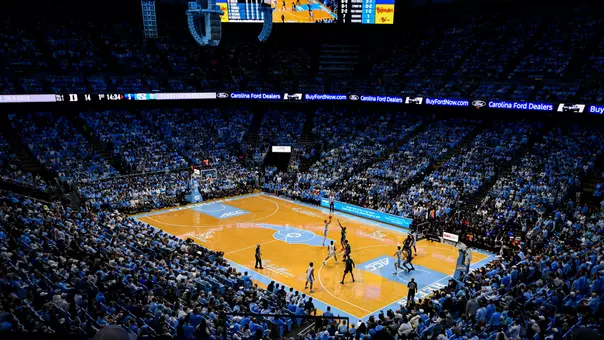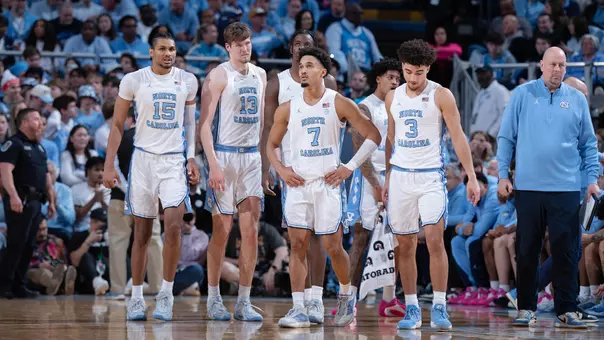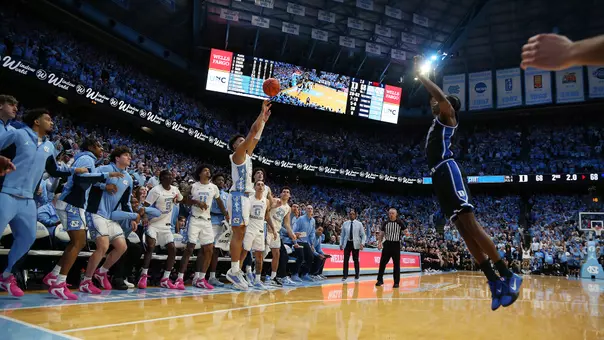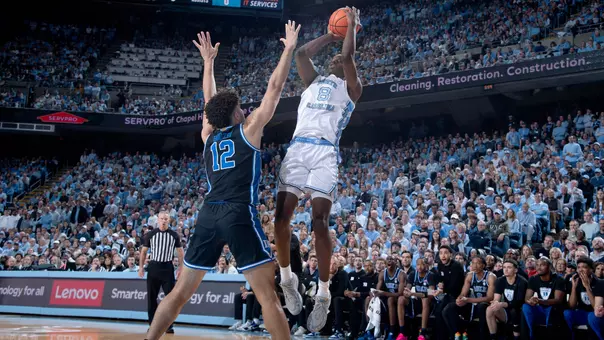University of North Carolina Athletics
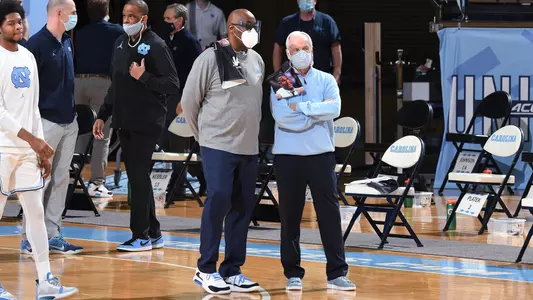
Photo by: Jeffrey A. Camarati
Lucas: Big John
February 17, 2021 | Men's Basketball, Featured Writers, Adam Lucas
Even in an unusual season, it felt right to honor John Thompson.
By Adam Lucas
One of the last places you'd expect to find a reminder of one of the cornerstones of Carolina basketball is a Wednesday night mid-February game against Northeastern scheduled with 48 hours notice.
But there has never been a season like this, so we shouldn't expect to get normal reminders. And so there was Roy Williams on Wednesday night, coaching his team to an 82-62 victory over the Huskies while wearing a towel over his shoulder that depicted former Georgetown coach John Thompson.
The towel was part of a National Association of Basketball Coaches initiative to honor the impact of Thompson, who died on August 30, 2020. It was a national movement but there were very few places it had more meaning than Chapel Hill, where Thompson was an honorary member of the Carolina family and one of Dean Smith's closest friends.
Some of these stories are going to be well-known to some of you, but those of us who can vividly picture Thompson towering on the sidelines need to remember that there's an entire generation that doesn't understand why John Thompson was important, and comprehend even less why John Thompson was important to Carolina when he never coached a single game for the Tar Heels.
There were no students in the risers on Wednesday to nudge each other and ask, "Why is Coach Roy wearing that towel?" and then have to google it. Television coverage was limited. There will be more focus in the days to come on games that aren't played than on the one that was.
Smith and Thompson were college basketball's odd couple throughout much of the 1970s, 80s and 90s. Thompson used to enjoy noting that he tried very hard not to like Smith. It didn't make much sense that the duo would click. Smith was midwestern, white, and absolutely refused to curse. Thompson was from the East Coast, Black, and peppered his everyday conversation with expletives. "I know two languages very well," Thompson said on a visit to Chapel Hill a few years ago. "One is English, and the other is profanity."
On the outside, they were so very, very different. But at their core they were so very similar. And maybe the way they connected so easily decades ago is what the rest of us are still trying to figure out in 2021.
What brought them together was their belief that coaching was just another avenue to be a teacher, and that their platform came with the added responsibility to do what they believed was right.
In 1989, Thompson walked off the court before a key Big East game against Boston College to protest the NCAA's Proposition 42, which he believed would have a disproportionate impact on Black athletes. He skipped the next game entirely. All the athletes and student-athletes who have used their platform in any way to express their political or social views in the turbulent last twelve months can trace their impact directly back to Thompson—and his good friend, Dean Smith. 1989 was the same year that Smith made a very public stand against a sign he believed disparaged the academic abilities of two of his Black players, one of many stands in his career that illustrated his belief of, "You shouldn't be proud of doing the right thing. You should just do the right thing."
There are plenty of coaches who say today that they respected Thompson and appreciated the chance to honor him. There are very few who stood beside him when it wasn't popular to do so, but Smith did. We see Thompson now as a revolutionary, as someone stirring up a particular kind of "good trouble." It was tougher—and less popular—to make those kinds of stands in the 1980s. For many coaches worried about their public perception, it was probably easier to not be allies with Thompson than to have a very public friendship with a man who was frequently in the center of controversy.
In 1976, facing a must-win appointment as the head coach of the United States Olympic team, Smith chose Thompson as his assistant coach. This was not the Thompson of the mid-1980s who was one of the most recognizable figures in college basketball. This was a coach who was just three years removed from being a high school basketball coach. On what at that time was one of the biggest stages in the game, Smith wanted Thompson by his side.
"I was blown away," Thompson wrote in his autobiography, I Came As A Shadow. "I have gone through life being selective about who I would like to give me their approval, and Dean was one of the few. I would never be an assistant coach for anybody but Dean Smith."
Their friendship spanned the decades, to the point that each coach's wife knew a call in the wee hours of the morning was almost certainly from the other coach. In 1982, Smith won his first national championship by defeating Thompson's Georgetown team, an uncomfortable matchup for both men.
"When the game ended," Thompson wrote, "before Dean celebrated with his team, he came over and gave me a hug. Then, as he walked away to congratulate his players, he looked back over his shoulder at me. Even in his moment of triumph, Dean was concerned about how I felt."
When Smith retired in the fall of 1997, Thompson was at the press conference, and as soon as it concluded, Smith insisted on driving Thompson to the airport, just one friend dropping off another…and two men who had done their best to change lives for the past several decades.
The only time they didn't talk regularly was in the final years of Smith's life. In a decision he would regret, Thompson didn't visit the ailing Smith. "I never went to see him when he got sick," Thompson said in Chapel Hill. "I couldn't do it. I didn't want to see him as human. It would've bothered me so much." His eyes filled with tears, and the big man broke down. "I ask Mrs. Smith to forgive me."
Dean Smith doubtless would have told him no forgiveness was necessary. And it felt fitting to have Thompson's picture on the towels worn by Williams and assistant coach Steve Robinson on Wednesday night. It felt even more appropriate when Williams switched to the type of fluffy white towel so often sported by Thompson.
"Big John was a great influence on me," Williams said, "and great friends with Coach Smith."
Which is plenty enough reason that honoring Thompson felt exactly right, even in the most unusual of seasons.
One of the last places you'd expect to find a reminder of one of the cornerstones of Carolina basketball is a Wednesday night mid-February game against Northeastern scheduled with 48 hours notice.
But there has never been a season like this, so we shouldn't expect to get normal reminders. And so there was Roy Williams on Wednesday night, coaching his team to an 82-62 victory over the Huskies while wearing a towel over his shoulder that depicted former Georgetown coach John Thompson.
The towel was part of a National Association of Basketball Coaches initiative to honor the impact of Thompson, who died on August 30, 2020. It was a national movement but there were very few places it had more meaning than Chapel Hill, where Thompson was an honorary member of the Carolina family and one of Dean Smith's closest friends.
Some of these stories are going to be well-known to some of you, but those of us who can vividly picture Thompson towering on the sidelines need to remember that there's an entire generation that doesn't understand why John Thompson was important, and comprehend even less why John Thompson was important to Carolina when he never coached a single game for the Tar Heels.
There were no students in the risers on Wednesday to nudge each other and ask, "Why is Coach Roy wearing that towel?" and then have to google it. Television coverage was limited. There will be more focus in the days to come on games that aren't played than on the one that was.
Smith and Thompson were college basketball's odd couple throughout much of the 1970s, 80s and 90s. Thompson used to enjoy noting that he tried very hard not to like Smith. It didn't make much sense that the duo would click. Smith was midwestern, white, and absolutely refused to curse. Thompson was from the East Coast, Black, and peppered his everyday conversation with expletives. "I know two languages very well," Thompson said on a visit to Chapel Hill a few years ago. "One is English, and the other is profanity."
On the outside, they were so very, very different. But at their core they were so very similar. And maybe the way they connected so easily decades ago is what the rest of us are still trying to figure out in 2021.
What brought them together was their belief that coaching was just another avenue to be a teacher, and that their platform came with the added responsibility to do what they believed was right.
In 1989, Thompson walked off the court before a key Big East game against Boston College to protest the NCAA's Proposition 42, which he believed would have a disproportionate impact on Black athletes. He skipped the next game entirely. All the athletes and student-athletes who have used their platform in any way to express their political or social views in the turbulent last twelve months can trace their impact directly back to Thompson—and his good friend, Dean Smith. 1989 was the same year that Smith made a very public stand against a sign he believed disparaged the academic abilities of two of his Black players, one of many stands in his career that illustrated his belief of, "You shouldn't be proud of doing the right thing. You should just do the right thing."
There are plenty of coaches who say today that they respected Thompson and appreciated the chance to honor him. There are very few who stood beside him when it wasn't popular to do so, but Smith did. We see Thompson now as a revolutionary, as someone stirring up a particular kind of "good trouble." It was tougher—and less popular—to make those kinds of stands in the 1980s. For many coaches worried about their public perception, it was probably easier to not be allies with Thompson than to have a very public friendship with a man who was frequently in the center of controversy.
In 1976, facing a must-win appointment as the head coach of the United States Olympic team, Smith chose Thompson as his assistant coach. This was not the Thompson of the mid-1980s who was one of the most recognizable figures in college basketball. This was a coach who was just three years removed from being a high school basketball coach. On what at that time was one of the biggest stages in the game, Smith wanted Thompson by his side.
"I was blown away," Thompson wrote in his autobiography, I Came As A Shadow. "I have gone through life being selective about who I would like to give me their approval, and Dean was one of the few. I would never be an assistant coach for anybody but Dean Smith."
Their friendship spanned the decades, to the point that each coach's wife knew a call in the wee hours of the morning was almost certainly from the other coach. In 1982, Smith won his first national championship by defeating Thompson's Georgetown team, an uncomfortable matchup for both men.
"When the game ended," Thompson wrote, "before Dean celebrated with his team, he came over and gave me a hug. Then, as he walked away to congratulate his players, he looked back over his shoulder at me. Even in his moment of triumph, Dean was concerned about how I felt."
When Smith retired in the fall of 1997, Thompson was at the press conference, and as soon as it concluded, Smith insisted on driving Thompson to the airport, just one friend dropping off another…and two men who had done their best to change lives for the past several decades.
The only time they didn't talk regularly was in the final years of Smith's life. In a decision he would regret, Thompson didn't visit the ailing Smith. "I never went to see him when he got sick," Thompson said in Chapel Hill. "I couldn't do it. I didn't want to see him as human. It would've bothered me so much." His eyes filled with tears, and the big man broke down. "I ask Mrs. Smith to forgive me."
Dean Smith doubtless would have told him no forgiveness was necessary. And it felt fitting to have Thompson's picture on the towels worn by Williams and assistant coach Steve Robinson on Wednesday night. It felt even more appropriate when Williams switched to the type of fluffy white towel so often sported by Thompson.
"Big John was a great influence on me," Williams said, "and great friends with Coach Smith."
Which is plenty enough reason that honoring Thompson felt exactly right, even in the most unusual of seasons.
Carolina Insider: Rapid Reactions pres. by Modelo – Men’s Basketball vs. Duke – February 7, 2026
Sunday, February 08
UNC Men's Basketball: Trimble's Three-Pointer Beats Duke, 71-68
Sunday, February 08
Rapid Reactions pres. by Modelo – Men’s Basketball vs. Duke – February 7, 2026
Saturday, February 07
UNC Men's Lacrosse: Tar Heels Defeat Jacksonville in Season Opener, 11-10
Saturday, February 07










